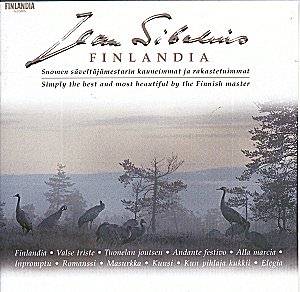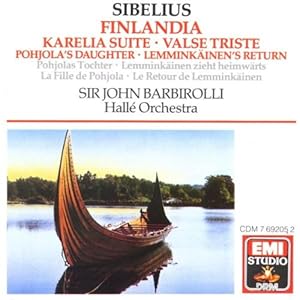 |
|
(1865 – 1957)
|
The core of Sibelius's oeuvre is his set of seven symphonies.
* Symphony No.1 - Paavo Jarvi conducting Orchestre de Paris
* Symphony No.2 - Leonard Bernstein conducting Wiener Philharmoniker
In addition, Sibelius's best-known compositions include
* Finlandia (see below)
* Karelia Suite
* Valse triste
* Violin Concerto in D minor
* The Swan of Tuonela (1 of 4 movements of the Lemminkäinen Suite).
Finlandia is a symphonic poem, composed as a covert protest against increasing censorship from the Russian Empire.
Most of the piece is taken up with rousing and turbulent music, evoking the national struggle of the Finnish people.
But towards the end, a calm comes over the orchestra, and the serenely melodic Finlandia Hymn is heard.
Most of the piece is taken up with rousing and turbulent music, evoking the national struggle of the Finnish people.
But towards the end, a calm comes over the orchestra, and the serenely melodic Finlandia Hymn is heard.
 Sibelius later reworked the Finlandia Hymn into a stand-alone piece. This hymn is one of the most important national songs of Finland (though Maamme is the national anthem).
Sibelius later reworked the Finlandia Hymn into a stand-alone piece. This hymn is one of the most important national songs of Finland (though Maamme is the national anthem).History:
In 1809, having been taken over by the armies of Tsar Alexander I in the Finnish War, Finland became an autonomous Grand Duchy in the Russian Empire, until the end of 1917, when the October Revolution in Russia changed the game anew. The right-wing government declared independence on December 6, 1917.
During World War II, Finland fought the Soviet Union twice: in the Winter War of 1939–40 after the Soviet Union had attacked Finland; and in the Continuation War of 1941–44, in which Germany invaded the Soviet Union.
Finland was never occupied by the Soviet forces and retained its independence, but at a heavy loss of about 93 000 soldiers killed.
Finland was never occupied by the Soviet forces and retained its independence, but at a heavy loss of about 93 000 soldiers killed.
Source: Wikipedia
“Finland belonged to Sweden from the 12th until the 19th century,
and after that it belonged to Russia.
It became independent in 1917 following the Russian Russian Revolution
and successfully resisted invasions from both the Soviet Union and Nazi Germany.
It maintains particularly close relations with the other Nordic countries.”

No comments:
Post a Comment